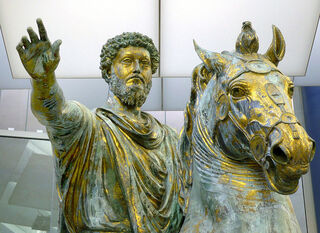Accept Life Like an Emperor
Marcus Aurelius on how to face adversity.
by Frank Martela Ph.D.Marcus Aurelius once faced a similar situation to what world leaders face right now: guarding your citizens during a pandemic. He was the emperor of Rome in 165 AD when the Antonine Plague broke out, devastating the population of the Roman Empire, causing up to 2,000 deaths a day in Rome, and killing millions of people overall—in some affected places, up to a quarter of the population. Without the aid of modern medical knowledge, Marcus Aurelius was helpless. There was not much else he could do than to watch how the horrible plague raged through his empire, killing several people close to him.
His consolation? Stoicism.
”Be like the rock that the waves keep crashing over. It stands unmoved and the raging of the sea falls still around it,” Marcus writes in his Meditations. External things as such are not the problem. ”It’s your assessment of them.” We must learn to be indifferent to things we can’t anyways control. ”Why is it so hard when things go against you? If it’s imposed by nature, accept it gladly and stop fighting it.”
There are thus two separate things: external events and your reaction to them. The former you can’t control. The latter you can. This distinction is at the heart of stoicism. Learning to accept the world as it is, to be unmoved by whatever adversities life throws at you, is the ideal that this philosophical school advocates: ”It is we who generate the judgments—inscribing them on ourselves. And we don’t have to.”
Being a stoic is, in Marcus Aurelius’s words, about ”a resolve to accept whatever happens as necessary and familiar, flowing like water from that same source and spring.”
How then to acquire this indifference?
The path to indifference and unconditional acceptance of life as it comes is by no means an easy feat. It requires years of intentional practice. Stoicism was not primarily about books and theories but about a way of living. You became a stoic not by memorizing its doctrines but through living like a stoic. Given that it is primarily a way of approaching life, the stoics had various practices and techniques that one could apply to acquire the level of indifference that help one to cope with even the most severe adversities in life.
Accepting your own mortality and the mortality of those around you was one. Marcus advised us to remind ourselves about that ”natural event” of life regularly, until it no longer scares us but becomes as trivial part of the lifecycle as grapes turning from unripe to ripened to raisins:
”In short, know this: Human lives are brief and trivial.
Yesterday a blob of semen; tomorrow embalming fluid, ash.
To pass through this brief life as nature demands. To give it up without complaint.
Like an olive that ripens and falls. Praising its mother, thanking the tree it grew on.”
Another technique Marcus Aurelius offers is to examine whatever is bugging you, and break it down to so small constituent parts as to make the whole thing trivial. He gives the example of a song. If you want to be indifferent to the effect that a song might have on you, "analyze the melody into the notes that form it, and as you hear each one, ask yourself whether you’re powerless against that. That should be enough to deter you." He recommends this same strategy to whatever is moving you: "Look at the individual parts and move from analysis to indifference. Apply this to life as a whole."
In our own times, acceptance and commitment therapy carries the torch of stoicism forwards. It is a form of behavioral and cognitive therapy that sees psychological inflexibility—being stuck in some unhealthy patterns of thinking—as a primary obstacle for growth and ability to pursue one’s goals, and also the source of many mental health problems. What the therapy aims to help the client to achieve is an openness to experience thoughts, emotions, and sensations as they are and without any intention to change them.

There are various techniques to get to this acceptance such as observing one’s negative thought dispassionately or repeating it out loud until only its sounds remain. If a certain pattern of thinking keeps repeating itself, "You are not good enough," ”You don’t deserve to be loved," or similar, it is labeled and given a name, and then the person can thank their mind for such an interesting thought.
So, what you need to do is to work on your acceptance skills. Acceptance is not just something we have or don’t have. It is an attitude that we can work on, and become better at through training. So, in addition to your bodily workout, make sure your daily practice includes some exercise in acceptance. That way you are prepared, when the sh*t hits the fan.